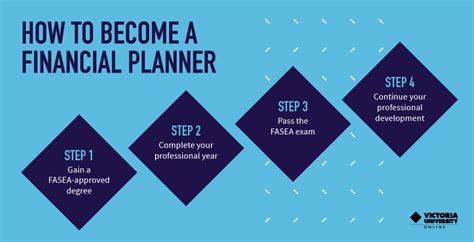Are you interested in helping people achieve their financial goals and become financially secure? Becoming a financial planner may be the perfect career for you. In today’s volatile economic landscape, strategic financial planning has never been more important. In this blog post, we will explore the steps to becoming a successful financial planner and the skills and knowledge required for this rewarding career. From understanding strategic financial planning to developing effective communication and interpersonal skills, navigating regulatory and compliance requirements, and leveraging technology for efficient planning, we will cover all the essential aspects of this profession. Whether you are considering a career change or are a student aspiring to enter the field of financial planning, this comprehensive guide will provide valuable insights into what it takes to become a successful financial planner. Join us as we delve into the world of strategic financial planning and discover the path to a fulfilling and lucrative career as a financial planner.
Table of Contents
Understanding Strategic Financial Planning
Strategic financial planning is a critical process for individuals and businesses to achieve their long-term financial goals. It involves assessing the current financial situation, identifying future objectives, and developing a comprehensive plan to achieve those goals. This process requires careful consideration of various factors such as income, expenses, investments, and risk tolerance in order to create a solid financial foundation.
Furthermore, strategic financial planning involves a deep understanding of economic trends, market dynamics, and regulatory changes that could impact financial decision-making. By staying informed and proactive, individuals and businesses can adapt their financial plans to optimize their outcomes and mitigate potential risks.
Ultimately, strategic financial planning enables individuals and businesses to make informed financial decisions that align with their long-term objectives. It provides a roadmap for achieving financial success and security, while also allowing for flexibility to adjust to changing circumstances.
Therefore, understanding strategic financial planning is crucial for anyone seeking to build and maintain a strong financial future.
Steps to Becoming a Financial Planner
First and foremost, obtain a bachelor’s degree in a related field such as finance, business, accounting, economics, or mathematics. This will provide a solid foundation in financial principles and knowledge that is essential for a career in financial planning.
Next, gain relevant work experience through internships, part-time jobs, or entry-level positions in the financial industry. This hands-on experience will help you understand the practical aspects of financial planning and develop important skills that are required in the field.
After gaining some experience, consider obtaining professional certifications such as Certified Financial Planner (CFP) or Chartered Financial Analyst (CFA). These certifications demonstrate your expertise and commitment to the profession, and can give you a competitive edge in the job market.
Finally, continuously educate yourself and stay updated with the latest trends and developments in the financial industry. This can be achieved through attending workshops, seminars, and pursuing advanced degrees or specialized training in financial planning.
Choosing the Right Education and Certifications
When it comes to choosing the right education and certifications for a career in financial planning, it’s important to consider the specific requirements of the field. Financial planners are entrusted with managing the finances and investments of individuals and businesses, so a strong educational foundation is essential. This includes obtaining a bachelor’s degree in finance, business, economics, or a related field. Additionally, pursuing certifications such as the Certified Financial Planner (CFP) designation can provide the necessary credentials and expertise to excel in this profession.
It’s crucial to research and evaluate the various education and certification programs available. Look for reputable institutions and programs that are accredited by recognized organizations such as the CFP Board. Choosing a program that offers a comprehensive curriculum and opportunities for hands-on experience through internships or practical projects can greatly enhance the learning experience and prepare individuals for the challenges of financial planning.
Furthermore, staying updated on the latest industry trends and regulations is vital for success in financial planning. Pursuing continuing education and professional development opportunities, such as advanced certifications or specialized courses, can demonstrate dedication to ongoing learning and skill enhancement. This commitment to continuous improvement is a key factor in choosing the right education and certifications to establish a fulfilling and successful career in financial planning.
Ultimately, the decision to pursue a career in financial planning and the choice of education and certifications is a significant investment in one’s future. By carefully considering the options, seeking guidance from experienced professionals, and staying informed about the evolving landscape of financial services, individuals can make informed decisions that pave the way for a rewarding and impactful career in financial planning.
Building a Strong Financial Planning Skillset
Building a strong financial planning skillset is essential for anyone looking to pursue a career in this field. It requires a combination of knowledge, experience, and expertise in various areas of finance and wealth management.
One of the key components of building a strong financial planning skillset is gaining a deep understanding of investment strategies and portfolio management. This involves staying up-to-date with market trends, investment products, and risk management techniques. A solid understanding of tax planning, retirement planning, and estate planning is also crucial for a financial planner to effectively meet the needs of their clients.
Another important skillset to develop is the ability to perform thorough financial analysis and create comprehensive financial plans. This requires strong quantitative skills, attention to detail, and the ability to interpret complex financial information. Additionally, effective communication and interpersonal skills are essential for building a strong financial planning skillset. Being able to clearly articulate complex financial concepts to clients and work collaboratively with other financial professionals is key to success in this field.
Lastly, leveraging technology for efficient planning is vital in the digital age. This includes proficiency in financial planning software, data analysis tools, and customer relationship management systems. As the financial planning landscape continues to evolve, staying abreast of technological advancements and incorporating them into one’s practice is critical for building a strong skillset.
Developing Effective Communication and Interpersonal Skills
Effective communication and interpersonal skills are essential for success in the field of financial planning. As a financial planner, you will need to be able to clearly convey complex financial information to your clients in a way that is easily understandable. You will also need to be able to build trust and rapport with your clients in order to understand their financial goals and develop a plan that meets their needs.
Developing effective communication skills starts with active listening. It is important to truly understand your clients’ needs and concerns before offering advice or solutions. This requires empathy and the ability to put yourself in your clients’ shoes. Additionally, being able to communicate in a clear, concise, and jargon-free manner will help ensure that your clients are well-informed and comfortable with the financial planning process.
Interpersonal skills are also crucial for financial planners. Building strong relationships with clients requires strong interpersonal skills, including the ability to build trust, manage conflicts, and understand non-verbal cues. Effective interpersonal skills will enable you to navigate difficult conversations, negotiate with clients, and ultimately build long-lasting, productive relationships.
Overall, developing effective communication and interpersonal skills is vital for success as a financial planner. By actively listening, communicating clearly, and developing strong interpersonal relationships, you can build trust with your clients and help them achieve their financial goals.
Navigating Regulatory and Compliance Requirements
When pursuing a career in financial planning, it is important to understand the regulatory and compliance requirements that are in place to ensure ethical and legal practices within the industry. Navigating these requirements is a crucial aspect of the job and requires a thorough understanding of the laws and regulations that govern financial planning.
Financial planners must familiarize themselves with the various regulatory bodies and organizations that oversee the industry, such as the Securities and Exchange Commission (SEC) and the Financial Industry Regulatory Authority (FINRA). These organizations set standards for conduct and enforce regulations to protect investors and maintain the integrity of the financial markets.
In addition to understanding the role of regulatory bodies, financial planners must also stay up to date on changing laws and regulations that may impact their practice. This may involve attending regular training and continuing education programs to ensure compliance with evolving requirements.
As such, navigating regulatory and compliance requirements is an ongoing process that requires diligence and attention to detail. By staying informed and adhering to all legal and ethical standards, financial planners can build trust with their clients and maintain a reputable and compliant practice.
Implementing Goal-Driven Financial Strategies
When it comes to implementing goal-driven financial strategies, it’s important to start by clearly defining your financial goals. Whether it’s saving for retirement, buying a home, or starting a business, having a specific goal in mind will help guide your financial decisions. Once you have your goals in place, the next step is to develop a detailed plan to achieve them. This may involve setting a budget, creating a savings plan, or investing in the stock market.
Another crucial aspect of implementing goal-driven financial strategies is to regularly monitor and evaluate your progress. This involves tracking your income and expenses, reviewing your investment portfolio, and making adjustments to your plan as needed. It’s also important to stay informed about the latest financial trends and market conditions, as these can impact your ability to reach your goals.
Furthermore, seeking professional advice from a financial planner or advisor can be beneficial when implementing goal-driven financial strategies. A qualified professional can help you create a personalized financial plan, provide guidance on investment decisions, and keep you accountable for sticking to your goals. Additionally, working with a financial professional can provide peace of mind and confidence in your financial future.
In conclusion, implementing goal-driven financial strategies involves setting clear goals, developing a plan, monitoring progress, staying informed, and seeking professional advice. By taking these steps, you can increase your chances of reaching your financial goals and securing a stable financial future.
Creating Comprehensive Financial Plans
When it comes to creating comprehensive financial plans, it is essential to consider all aspects of a client’s financial situation. This includes their short-term and long-term goals, assets, liabilities, income, and expenses. Taking a holistic approach to financial planning allows for a more thorough and effective strategy to be developed.
Additionally, it is important to take into account potential risks and uncertainties that could impact the client’s financial future. This may involve creating contingency plans and exploring various investment options to ensure the plan is resilient in the face of economic fluctuations.
Moreover, creating comprehensive financial plans involves thorough research and analysis. This includes evaluating tax implications, inflation rates, and potential market fluctuations. By conducting a comprehensive analysis, financial planners can develop more accurate and effective strategies for their clients.
Lastly, communication and collaboration with the client are crucial in creating comprehensive financial plans. Understanding the client’s risk tolerance, preferences, and concerns is essential to tailor the plan to their specific needs and circumstances.
Leveraging Technology for Efficient Planning
When it comes to financial planning, leveraging technology can greatly enhance efficiency and accuracy in the process. Utilizing the latest software and digital tools allows financial planners to analyze data, create projections, and develop comprehensive plans with greater speed and precision.
By incorporating financial planning software into their practice, professionals can streamline repetitive tasks, automate calculations, and generate reports in a fraction of the time it would take to do so manually. This not only saves time but also reduces the margin for error, leading to more reliable financial plans for clients.
Additionally, leveraging technology enables financial planners to access real-time market data, track investment performance, and model various scenarios to assess potential outcomes. This level of agility and responsiveness is crucial in adapting to rapidly changing market conditions and client needs.
Furthermore, embracing digital tools for client communication and collaboration can improve the overall client experience and strengthen the advisor-client relationship. Online portals, video conferencing, and secure messaging platforms allow for seamless interactions and the exchange of information, promoting transparency and trust.
Continuing Education and Professional Development
Continuing education and professional development are essential aspects of any successful financial planner’s career. In order to stay competitive in the constantly evolving financial industry, it is crucial for financial planners to stay up to date with the latest trends, regulations, and best practices.
One of the key benefits of continuing education is the opportunity for professional development. By pursuing additional certifications, attending workshops and seminars, or enrolling in advanced courses, financial planners can expand their knowledge and skills, allowing them to better serve their clients and enhance their career prospects.
Staying abreast of the latest industry trends and innovations is also vital for financial planners. This can include learning about new technologies that can streamline the planning process, studying market trends and investment strategies, or understanding changes in tax laws and regulations.
Ultimately, continuing education and professional development are not only beneficial for individual financial planners, but also for the clients they serve. By continuously improving their knowledge and skills, financial planners can provide more comprehensive and effective financial advice, leading to better outcomes for their clients.





